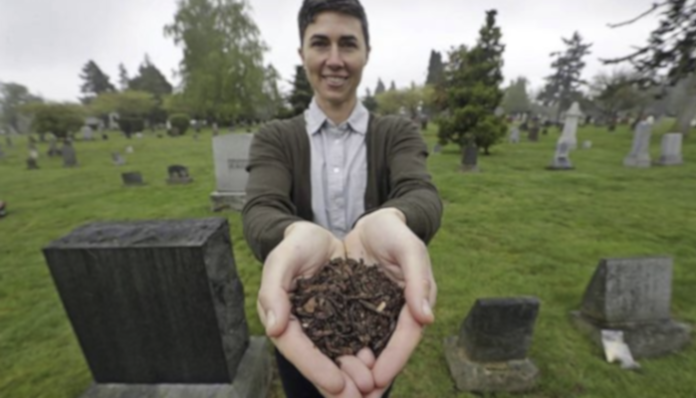
Last week, Washington became the first state to approve composting as an alternative to burial or cremation after death. The law allows licensed facilities to offer “natural organic reduction” as a means of postmortem disposal. This process turns a body into soil by mixing the remains with substances like wood chips or straw.
Katrina Spade developed the concept of human composting. Her inspiration? Farmers who use this method to dispose of livestock. Spade found that a mixture of wood chips, alfalfa, and straw created the nitrogen and carbon needed to accelerate natural decomposition. You simply need to place the body and mixture into a temperature and moisture-controlled rotating vessel for a few weeks. Now, Spade is developing her company to offer human composting: Recompose.
Supporters say that this burial method is not only the most environmentally friendly, but it’s also the most meaningful purpose for bodies even after death.
This new concept rivals other disposal methods for many reasons. Conventional burials take up land, which is a hot commodity in many overcrowded parts of the country. Furthermore, cemeteries also contaminate groundwater with chemicals. Cremation doesn’t require the same space as coffin burials, but it does emit carbon dioxide and other byproducts into the air.
In addition to the positive environmental impact, this new method allows families to utilize the remains of their loved ones however they choose. Instead of visiting a depressing and cold cemetery, people can use the soil to plant trees or other plants. Our bodies can literally return back to dust with this method, not to mention provide something lovely out of the pain and loss.
Finally, the price is right for human composting, too. The average burial costs between $8,000 and $25,000. Cremation costs upwards of $6,000. Spade hopes to charge about $5,500 for human composting with Recompose. If nothing else, the price tag is an appealing factor.
Would you choose to compost your body after death? Why or why not? Share your thoughts with us!
Feature Image via Instagram


















